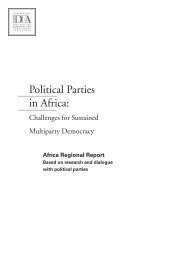Background Document - Danish Institute for Parties and Democracy
Background Document - Danish Institute for Parties and Democracy
Background Document - Danish Institute for Parties and Democracy
You also want an ePaper? Increase the reach of your titles
YUMPU automatically turns print PDFs into web optimized ePapers that Google loves.
ence of a supportive family has often been cited as the reason <strong>for</strong> their active participation.<br />
This dependence syndrome often means that those who do not have this support<br />
system may not be able to enter local politics even if they have the qualities <strong>and</strong> inclination<br />
to do so.<br />
´ Absence of support from political parties: Political parties have historically acted as gatekeepers<br />
to political participation <strong>and</strong> there is considerable evidence from South Asia<br />
that when it comes to giving tickets to women at any level a clear bias exists in favour of<br />
male c<strong>and</strong>idates. Due to the rhetoric around gender equality political parties field some<br />
women c<strong>and</strong>idates but often these are more signs of tokenisms. It does not necessarily<br />
come out of a change in gender ideology that regards equal participation as a norm.<br />
“The in<strong>for</strong>mal factors that enable women to<br />
succeed to political positions cannot be discussed in<br />
isolation from the <strong>for</strong>mal processes.”<br />
WHAT DIFFERENCE DO WOMEN MAKE IN LOCAL POLITICS<br />
Research appears to indicate that women in local government believe they can make a<br />
difference as women leaders by bringing a different style to local government <strong>and</strong> approaching<br />
the job in a different way. Drage (2001) indicates that increasing the number<br />
of women in local government will “accelerate the pace of change, promote collaborative<br />
styles of leadership <strong>and</strong> decision-making, broaden perspectives <strong>and</strong> move<br />
communities <strong>for</strong>ward.”<br />
The report on Comparative study of Women in Local Government in Asia <strong>and</strong> the<br />
Pacific make the following points about the changes that women can bring to local<br />
politics. According to the report women have a greater sense of the social issues <strong>and</strong><br />
the well being <strong>and</strong> welfare of their communities <strong>and</strong> factor these into the decisionmaking<br />
process; promote policies <strong>and</strong> activities which strengthen communities; encourage<br />
participation; emphasise the importance <strong>and</strong> the practice of good communication<br />
with the community; have a different approach to the way their local authority<br />
is governed; develop a team approach; set different priorities; bring the mediation<br />
skills that they have developed as mothers, the ability to have clear goals, to juggle<br />
many tasks at once, <strong>and</strong> to be practical; are dedicated, responsible, practice what they<br />
preach <strong>and</strong> show a great deal of spirit <strong>and</strong> stimulate <strong>and</strong> encourage other women to be<br />
part of development. The study further elaborates:<br />
“Women’s concerns <strong>and</strong> priorities are more likely than are those of men to<br />
center on people’s needs <strong>for</strong> safety <strong>and</strong> clean water supplies <strong>and</strong> <strong>for</strong> community<br />
facilities rather than just the traditional roads, rates <strong>and</strong> rubbish. Women also have<br />
a strong focus on women’s issues <strong>and</strong> a human rights flavor in their goals <strong>for</strong> local<br />
government, suggesting that changes in local politics will lead to changes in society,<br />
less discrimination against women <strong>and</strong> greater flexibility in work <strong>and</strong> childcare.<br />
By bringing a grassroots perspective to local government, women make it more<br />
people orientated <strong>and</strong> closer to the community it serves.”<br />
WOMEN IN POLITICS DANISH INSTITUTE FOR PARTIES AND DEMOCRACY PAGE 30
















